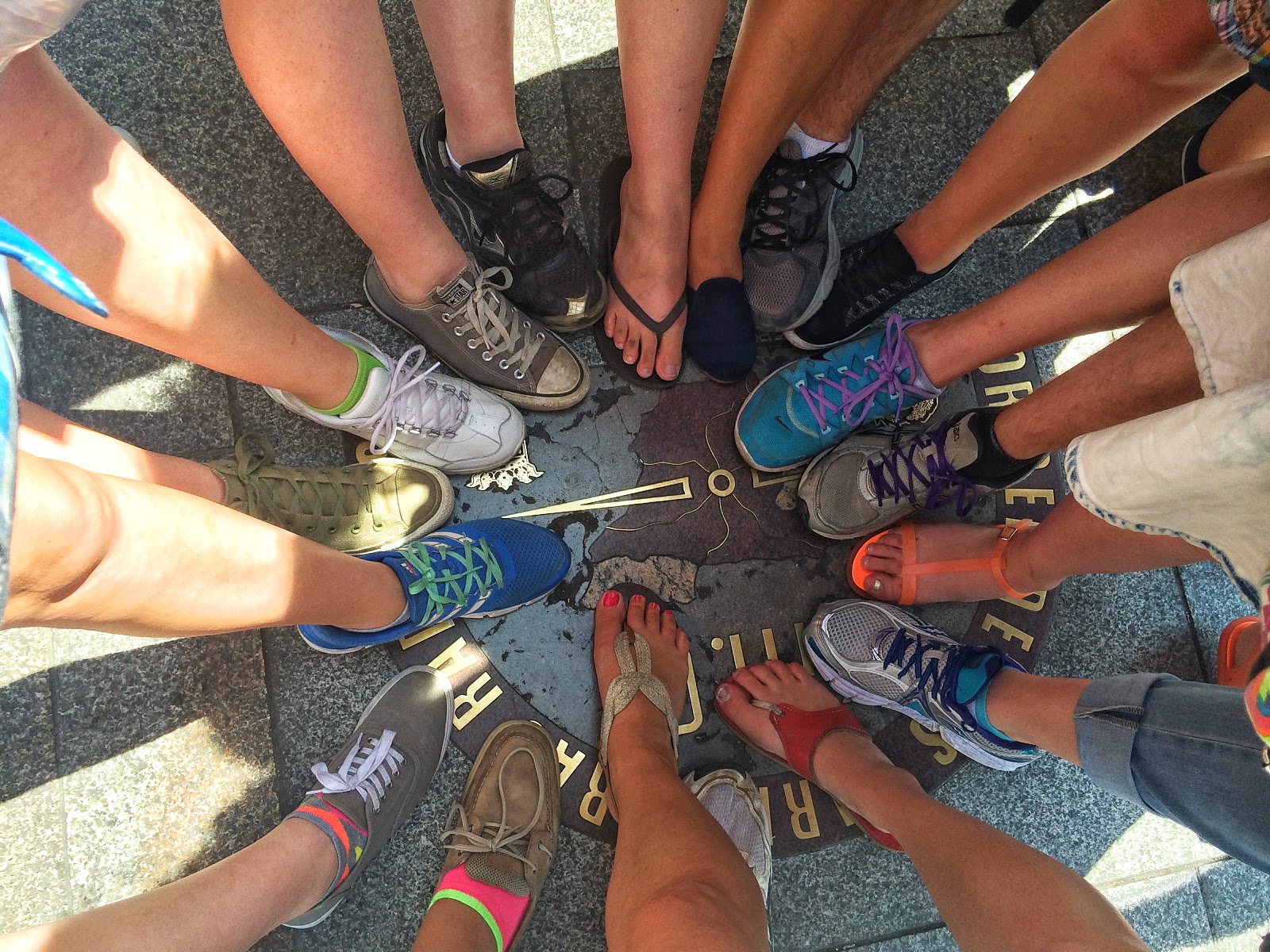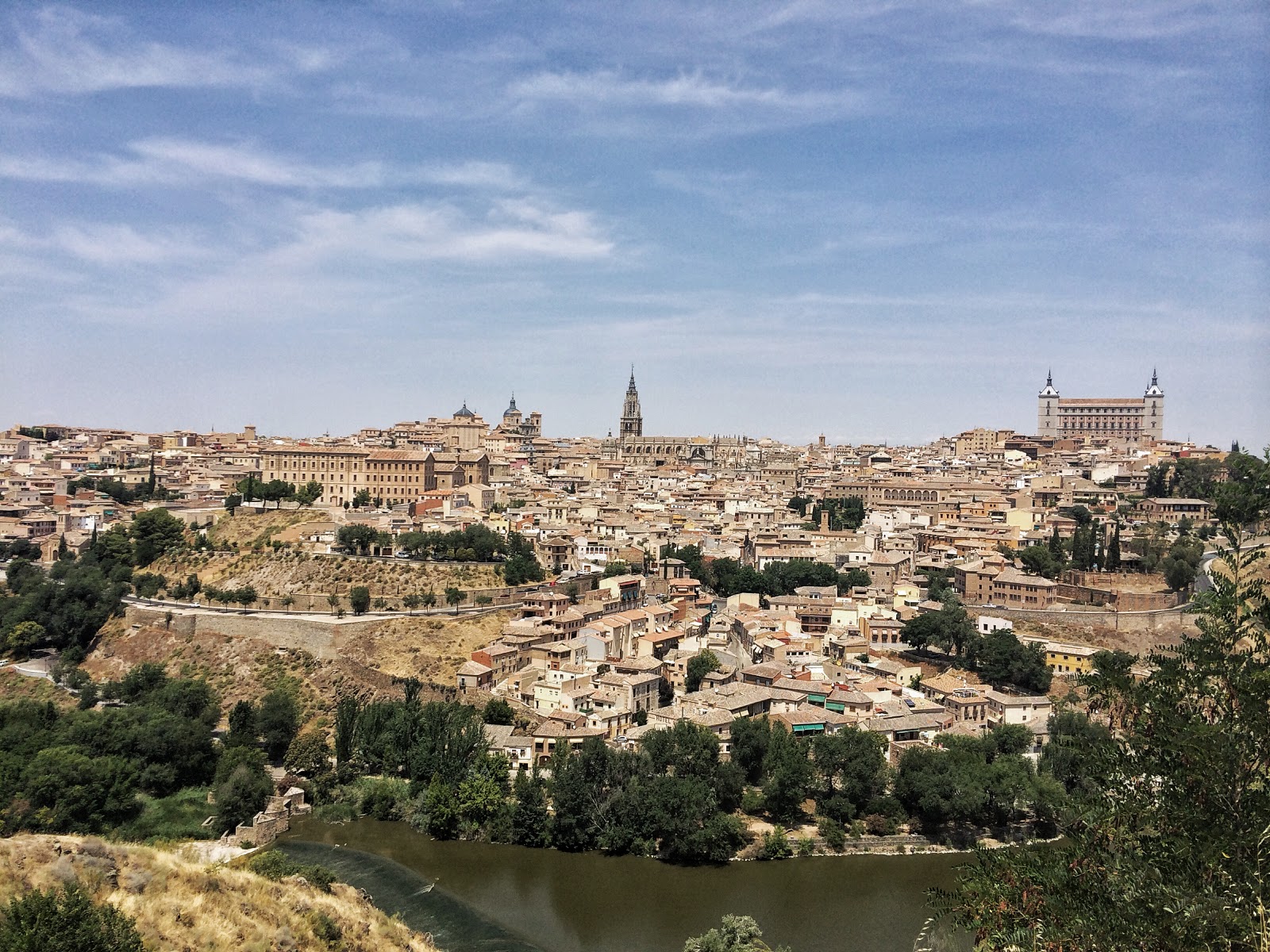Here are a few more final essays from your students...
IUHPFL - León 2014
Sunday, July 27, 2014
Hasta luego España, hola Indiana
While some of the students might disagree, I've always found the last day of the Program to be the hardest because they are neither with their Spanish families nor their American ones and, although we've tried our best to prepare them for what the return home would be like,they are inevitably lost in translation.
On behalf of Equipo León 2014, I would like to thank you all for sharing your incredibly smart, talented, and adventurous children with us this summer. It has been a pleasure to get to know and work with them here in Spain and I sincerely hope they have enjoyed the IUHPFL experience as much as we have.
La autoexpresión a través del arte/Self-expression through art
Artwork by Kate Kimball
While each one of us instructors could go on (and on) about all of your child's linguistic and academic achievements this summer, I'd like to take a moment to share with all of you one particular project that the students did as a final "essay" for my culture class because it is one that I am very proud of and they should be too. Instead of asking for a traditional essay or research paper, I asked the students to create a drawing, painting or sketch in the style of one of the artists we studied and to use their experience abroad as their theme. Then, I asked them to explain their inspiration and their piece, as almost all artists must do at some point in their careers. The results, simply put, were amazing. While some have natural talent, others have recently discovered theirs and found this type of self-expression to be much more real and gratifying than a page filled with words and another with sources.
To my artists, I say "¡felicidades!" on a job well done.
These works have been saved and will be sent to the students as part of a León time capsule (of sorts) so you too can enjoy them.
Also, as credit should be given where it is due, I am very grateful for my friend and colleague at Marian Catholic who uses this project each year with her Spanish III students and shared the idea with me.
While each one of us instructors could go on (and on) about all of your child's linguistic and academic achievements this summer, I'd like to take a moment to share with all of you one particular project that the students did as a final "essay" for my culture class because it is one that I am very proud of and they should be too. Instead of asking for a traditional essay or research paper, I asked the students to create a drawing, painting or sketch in the style of one of the artists we studied and to use their experience abroad as their theme. Then, I asked them to explain their inspiration and their piece, as almost all artists must do at some point in their careers. The results, simply put, were amazing. While some have natural talent, others have recently discovered theirs and found this type of self-expression to be much more real and gratifying than a page filled with words and another with sources.
To my artists, I say "¡felicidades!" on a job well done.
These works have been saved and will be sent to the students as part of a León time capsule (of sorts) so you too can enjoy them.
Also, as credit should be given where it is due, I am very grateful for my friend and colleague at Marian Catholic who uses this project each year with her Spanish III students and shared the idea with me.
Friday, July 25, 2014
Last minute Madrid...
Following our excursion to Toledo, we headed back to the capital to see what we could in the time we had left. While one group headed to the famous Bernabéu soccer stadium, another headed back to the centro and the Parque del Buen Retiro (like the Spanish-version of Central Park). Of course, a few of the girls needed to find "proper" hydration before going anywhere. :)
The group I headed with Sara went first to the Kilometro 0, the starting point for the Spanish radial road network and literally, the center of the country.
Our next stop was the Parque de Buen Retiro. The park was first commissioned by the royal family of Spain as part of a retreat center in the early 16th century, following the moving of the capital city to Madrid. Covering over 350 acres, there is much to see and do here and the park definitely fills the past and current need of residents having a place to "relax" in the middle of the city. Here is just glimpse of what we saw.
The group I headed with Sara went first to the Kilometro 0, the starting point for the Spanish radial road network and literally, the center of the country.
Our next stop was the Parque de Buen Retiro. The park was first commissioned by the royal family of Spain as part of a retreat center in the early 16th century, following the moving of the capital city to Madrid. Covering over 350 acres, there is much to see and do here and the park definitely fills the past and current need of residents having a place to "relax" in the middle of the city. Here is just glimpse of what we saw.
The city of El Greco...
Like Segovia, Toledo is a city that was once a thriving home to three cultures: Christian, Muslim and Jewish, all of which undoubtedly left their mark on the city. Located about 70 km from Madrid, the city was the former capital of the Kingdom of Castile and serves as the current capital for the autonomous community of Castilla-La Mancha (hence, the wide variety of Don Quijote-themed decorations and souvenirs available to the desiring shopper.) Here we visited the Álcazar, which was largely reconstructed following near-destruction during the Spanish civil war, the Plaza Mayor, the Claustro de Santa Isabel and also the Primada Catedral de Santa María. We also indulged in a few local traditions, such as sampling the delicious mazapanes and purchasing handmade jewelry/swords/daggers crafted in the demasquinado style. Here is a glimpse of what our day looked like.
The view in the last three pictures is the same one that the world-famous artist El Greco tried to capture in many of his paintings. Those who went into the cathedral also got to see an impressive display of his works.
The view in the last three pictures is the same one that the world-famous artist El Greco tried to capture in many of his paintings. Those who went into the cathedral also got to see an impressive display of his works.
Madrid maratón
After a brief stop in Medina del Campo (where we stopped before, almost six weeks to the day!), we made our way to Spain's bustling capital city, Madrid. As the third-largest city in the European Union and spanning over 233 square miles, Madrid can intimidate even the most traveled student. It was not exactly love at first sight for our group and many expressed their wish to go back to León before we even left the bus. Our plan was to win them over with the full day of sightseeing we had ahead.
Our Madrid maratón started with a visit to Plaza España, located just off the Gran Vía in the heart of the city. Although the regular mercadillo (small market) was closed, the students did find two of the most important characters in Spanish literature - Don Quijote and Sancho Panza.
Our Madrid maratón started with a visit to Plaza España, located just off the Gran Vía in the heart of the city. Although the regular mercadillo (small market) was closed, the students did find two of the most important characters in Spanish literature - Don Quijote and Sancho Panza.
From there, we walked to the nearby Palacio real, where neither the current (or the recently retired) king live but state events are held. Taking 17 years to build, the palace was constructed at the site of a Moorish mayrit and a later Álcazar. As many of the palace rooms are open for viewing, that's just what we did - taking complete advantage of the cooler air and the shade!
From the same palace courtyard where this picture was taken, we could see Santa María la Real de La Almudena - Madrid's cathedral. When Prince Felipe (now King Felipe VI) married his wife Letizia, she famously made her way from the palace, across the court, to the steps of the cathedral for all to see. This cathedral is quite different from others that we have visited as it not only is it relatively new (it was consecrated by Pope John Paul in the early 1990's) but it is also very modern in style, featuring pop-art esque stained glass windows throughout the building, brightly hued ceilings, and a chapel done in tones of gold.
We made a quick detour to the Plaza Mayor, formerly used as a bullring and market and now the site of many shops and restaurants, and an occasional concert or two,
Then, our travels through the more "modern" Madrid continued as we made our way to the Museo de la Reina Sofia, a cornerstone of the what is considered the "art triangle" of Madrid (Reina-Thyssen-Prado) and home to countless works by Spanish masters such as Dalí, Picasso and Miró. Here, the students got to see cultura en acción and most notably the moving piece Guernica (by Picasso) that we learned about in class. The curious piece below, in the main entry of the museum, is always a favorite for pictures.
Following our tour of the Reina Sofia, we hit the next point of the "art triangle," the Prado. The Prado is home to the "old" or classical art and houses a collection comparable to that in the the Louvre of Paris, including works by Goya, Velázquez, Sorolla, El Greco, El Bosco, etc. Here again students were able to witness cultura en acción and see many of the famous pieces we talked about in class.
Before dinner, we passed the famous Plaza de Cibeles, Metropolis and Communications building as we made our way to the Gran Vía to get to Puerta del Sol.
In the Puerta del Sol, we stopped for a moment by the well-known oso, a one time inhabitant and now symbol of the city.
By that time, I don't know who was more hungry - the bear or the students. We divided into two groups, those who wanted Mexican (craving the comida picante that is scarce on this side of the Atlantic) and those who wanted to have one last meal of tapas. From there, we all made our way back to the residencia (student dorms) where we were staying as we'd have another long day ahead, taking on Toledo.
Hasta luego León, hola Madrid...
On Thursday morning, we were all up early to leave to the city we have called home for the past six weeks. There were lots of hugs and tears, but most notably - a lot of promises to keep in touch and return.
Subscribe to:
Posts (Atom)




































